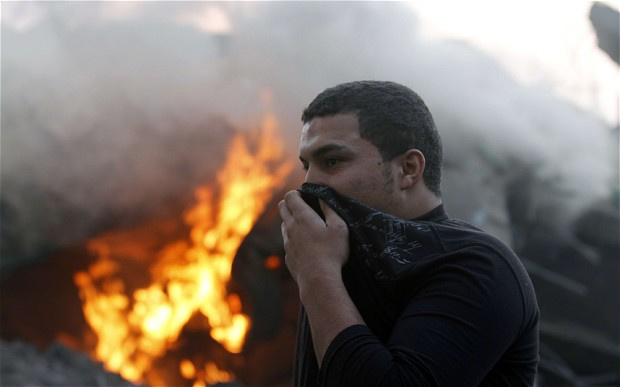Egypt Compromises, Gaza Burns

What is the reason behind the attacks of the Zionist regime against the Gaza Strip? While Palestine's Resistance Front has been silent for a long time, the Hamas movement seeks influence in the governments of developed Arab countries. Under these conditions, where popular protests in the region, rather than being focused on the Zionist occupation and occupiers, are aimed at the authoritarian rulers, why has the occupying regime of Israel chosen this point in time for its operations against the Palestinians of the Gaza Strip? Don't they know that with the bombardment and killing of the defenseless people of Gaza, the anger of the people of the region would change its focus from anti-dictatorship to this regime’s occupation? What factors caused this unexpected decision?
These are the questions that have occupied the minds of many. Of course, different interpretations have been made with regard to the Zionists' decision. I, personally, believe that it seems impossible that Israeli officials were not aware of the negative consequences of the escalation of military conflicts with the Palestinian Resistance. Since long ago, the recommendations of western and Israeli research and strategic centers to the occupying regime have been to let the Arabs be occupied with their own issues; they should not be provoked and the arrow of the domestic protests should not be pointed at Israeli officials in continuing settlement-building, the gradual Judaism of Jerusalem and the issue of occupation. It seems that three factors have been involved in the Zionists' decision:
1. There is almost no doubt that the timing of this operation at this juncture is for the domestic use of the Likud Party and the radicals, in order to increase their votes in the early election next January.
2. The assassination of the military leaders of the Resistance under any conditions is a priority for Israeli leaders. Therefore, there is no red line to undertake this decision. Ahmed al-Jabari, the commander of the Izz al-Din al-Qassam Brigades, has been on the terrorist list of the Zionists since a long time ago; hence, he had been hiding out for months.
There are political reasons why this incident is more important than the military measures and must not be ignored. The Israelis must, basically, consider more long-term goals. They probably believe that the issue of recent conflicts with the Palestinians will be stopped and this file will no longer be the priority of the protests and anger of the people of the region and the issue of Syria's crisis, with all its details, including religious and tribal disputes, will once again be placed on top of the list of issues of concern for the region and its people. It seems that the objective behind this measure is to complete the politicization of Hamas and destroy the Resistance.
Why do we come to this conclusion? We should look at the entirety of developments in the region. Today, the powerful leverage in the hands of Hamas in regional equations is the coming to power of the Muslim Brotherhood (in line with Hamas’ ideological views) in Morsi’s Egypt, Rachid Al-Ghannouchi’s Tunisia, and Erdogan’s Turkey. To this side of the equation, one should add Hamad’s Qatar and its role in all regional developments. Therefore, due to the developments of recent years, the political capacities of Hamas have increased in the region. Israeli leaders’ impression and their reading of Hamas’ domestic developments is that this movement has been separated from Iran and Syria and is in the arms of Egypt and Qatar. The Zionists’ impression of the current situation in the region is that Egypt and the Muslim Brotherhood, in general, have no plan, at the moment, to confront this regime. They have come to this conclusion bearing in mind the fact that Egypt has sent its new ambassador to Tel Aviv, Morsi has sent a warm message to the Israelis, he has refrained from discussing the Camp David Accord or even balancing some of its provisions, and that he has prevented the activation of Sinai’s geography in anti-Zionist operations. Beside the above-mentioned points, through its expanded attacks against the Gaza Strip, Israel has once again put the reaction of the Egyptians to the test. Their assessment of the relatively mild political statements of Egyptian officials is probably that Egypt has no plan for serious confrontation. Qatar also helps this trend; the visit of the Emir of Qatar to Gaza and his numerous aids to the Hamas government (which many believe were aimed at separating Hamas from the Resistance movement and Iran) must be considered within the same scenario. On this basis, the objective of the recent measures of the Zionists must be viewed in a long-term process that is to attempt to completely politicize Hamas and destroy its military wing. The assassination of the Jihadist leaders of Hamas and the destruction of its resistance infrastructures will continue until the complete surrender of the political leaders. The Zionists had previously used this measure in the late 1980s to force Fatah and the Palestine Liberation Organization to surrender.
In order to prevent this matter, the resisting movement inside Hamas and Gaza must dominate its political aspect; the new Egypt and the Muslim Brotherhood must stand firmly and take serious and non-conservative measures. It is the awareness of the Palestinians and the people of Egypt of this scenario which can, in the end, neutralize the attempts made by the Israeli leaders. Otherwise, the future of Palestinian developments would be vague and would have no positive results.

